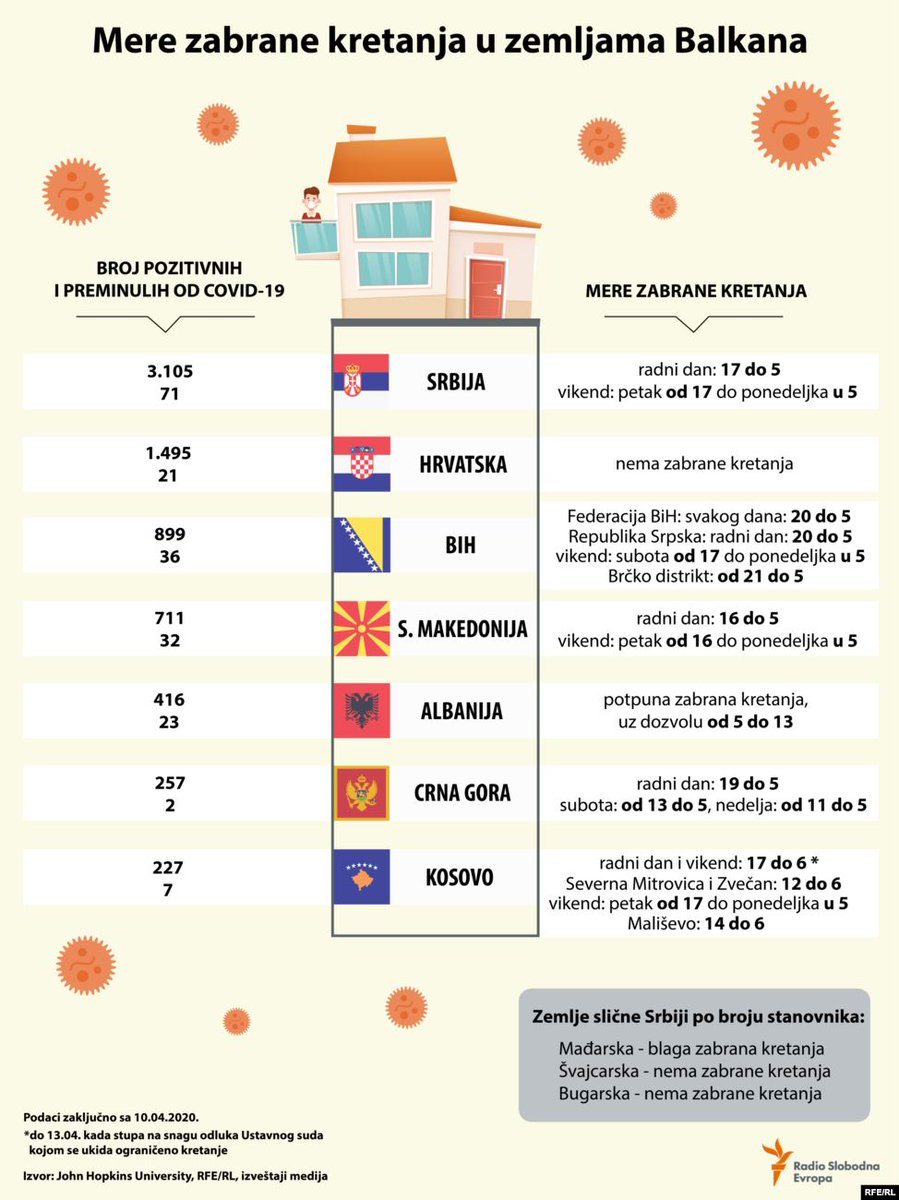1. Deep distrust between state and society. State does not believe citizens will behave responsibly. Citizens don& #39;t trust instructions of the state. (2/7)
2. The state can afford to be more coercive than in liberal democracies with a vibrant public debate that is informed by experts. (3/7)
3. Citizens are used to the state be a source of repression and thus are more willing to accept repressive measures. (4/7)
4. The health systems are fragile due to 30 years of underinvestment and emigration. States cannot afford lighter measures. (5/7)
Not convinced by following arguments: -people are not disciplined (this is a effect, not a cause),- its just and autocratic reflex (otherwise  https://abs.twimg.com/emoji/v2/... draggable="false" alt="🇷🇸" title="Flag of Serbia" aria-label="Emoji: Flag of Serbia"> would be doing, but not
https://abs.twimg.com/emoji/v2/... draggable="false" alt="🇷🇸" title="Flag of Serbia" aria-label="Emoji: Flag of Serbia"> would be doing, but not  https://abs.twimg.com/emoji/v2/... draggable="false" alt="🇲🇰" title="Flag of Macedonia" aria-label="Emoji: Flag of Macedonia">
https://abs.twimg.com/emoji/v2/... draggable="false" alt="🇲🇰" title="Flag of Macedonia" aria-label="Emoji: Flag of Macedonia"> https://abs.twimg.com/emoji/v2/... draggable="false" alt="🇽🇰" title="Flag of Kosovo" aria-label="Emoji: Flag of Kosovo">) -lack of enforcement capacity (police per capita is greater in nearly all WB6). (6/7)
https://abs.twimg.com/emoji/v2/... draggable="false" alt="🇽🇰" title="Flag of Kosovo" aria-label="Emoji: Flag of Kosovo">) -lack of enforcement capacity (police per capita is greater in nearly all WB6). (6/7)
- its better than people dying. many other European countries reduce numbers with less repressive measures and many of the measures are counterproductive (limited times for mobility increases crowds). (7/7)

 Read on Twitter
Read on Twitter https://abs.twimg.com/emoji/v2/... draggable="false" alt="🇦🇱" title="Flag of Albania" aria-label="Emoji: Flag of Albania">https://abs.twimg.com/emoji/v2/... draggable="false" alt="🇷🇸" title="Flag of Serbia" aria-label="Emoji: Flag of Serbia">https://abs.twimg.com/emoji/v2/... draggable="false" alt="🇧🇦" title="Flag of Bosnia & Herzegovina" aria-label="Emoji: Flag of Bosnia & Herzegovina">https://abs.twimg.com/emoji/v2/... draggable="false" alt="🇽🇰" title="Flag of Kosovo" aria-label="Emoji: Flag of Kosovo">https://abs.twimg.com/emoji/v2/... draggable="false" alt="🇲🇪" title="Flag of Montenegro" aria-label="Emoji: Flag of Montenegro"> have some of the most restrictive measures in Europe to fight #covid including long curfews (60 hours). I am wondering why. Here are some hypotheses (a thread 1/7)" title="https://abs.twimg.com/emoji/v2/... draggable="false" alt="🇲🇰" title="Flag of Macedonia" aria-label="Emoji: Flag of Macedonia">https://abs.twimg.com/emoji/v2/... draggable="false" alt="🇦🇱" title="Flag of Albania" aria-label="Emoji: Flag of Albania">https://abs.twimg.com/emoji/v2/... draggable="false" alt="🇷🇸" title="Flag of Serbia" aria-label="Emoji: Flag of Serbia">https://abs.twimg.com/emoji/v2/... draggable="false" alt="🇧🇦" title="Flag of Bosnia & Herzegovina" aria-label="Emoji: Flag of Bosnia & Herzegovina">https://abs.twimg.com/emoji/v2/... draggable="false" alt="🇽🇰" title="Flag of Kosovo" aria-label="Emoji: Flag of Kosovo">https://abs.twimg.com/emoji/v2/... draggable="false" alt="🇲🇪" title="Flag of Montenegro" aria-label="Emoji: Flag of Montenegro"> have some of the most restrictive measures in Europe to fight #covid including long curfews (60 hours). I am wondering why. Here are some hypotheses (a thread 1/7)" class="img-responsive" style="max-width:100%;"/>
https://abs.twimg.com/emoji/v2/... draggable="false" alt="🇦🇱" title="Flag of Albania" aria-label="Emoji: Flag of Albania">https://abs.twimg.com/emoji/v2/... draggable="false" alt="🇷🇸" title="Flag of Serbia" aria-label="Emoji: Flag of Serbia">https://abs.twimg.com/emoji/v2/... draggable="false" alt="🇧🇦" title="Flag of Bosnia & Herzegovina" aria-label="Emoji: Flag of Bosnia & Herzegovina">https://abs.twimg.com/emoji/v2/... draggable="false" alt="🇽🇰" title="Flag of Kosovo" aria-label="Emoji: Flag of Kosovo">https://abs.twimg.com/emoji/v2/... draggable="false" alt="🇲🇪" title="Flag of Montenegro" aria-label="Emoji: Flag of Montenegro"> have some of the most restrictive measures in Europe to fight #covid including long curfews (60 hours). I am wondering why. Here are some hypotheses (a thread 1/7)" title="https://abs.twimg.com/emoji/v2/... draggable="false" alt="🇲🇰" title="Flag of Macedonia" aria-label="Emoji: Flag of Macedonia">https://abs.twimg.com/emoji/v2/... draggable="false" alt="🇦🇱" title="Flag of Albania" aria-label="Emoji: Flag of Albania">https://abs.twimg.com/emoji/v2/... draggable="false" alt="🇷🇸" title="Flag of Serbia" aria-label="Emoji: Flag of Serbia">https://abs.twimg.com/emoji/v2/... draggable="false" alt="🇧🇦" title="Flag of Bosnia & Herzegovina" aria-label="Emoji: Flag of Bosnia & Herzegovina">https://abs.twimg.com/emoji/v2/... draggable="false" alt="🇽🇰" title="Flag of Kosovo" aria-label="Emoji: Flag of Kosovo">https://abs.twimg.com/emoji/v2/... draggable="false" alt="🇲🇪" title="Flag of Montenegro" aria-label="Emoji: Flag of Montenegro"> have some of the most restrictive measures in Europe to fight #covid including long curfews (60 hours). I am wondering why. Here are some hypotheses (a thread 1/7)" class="img-responsive" style="max-width:100%;"/>


